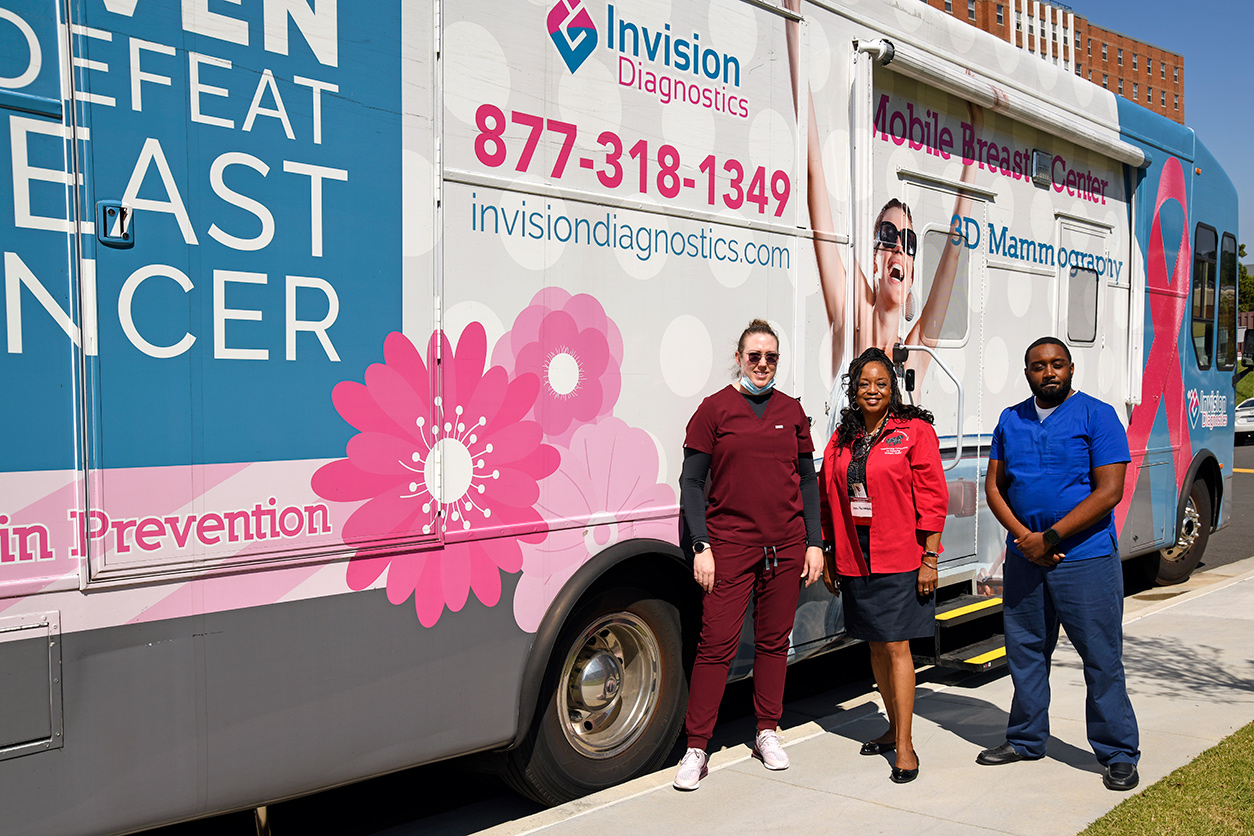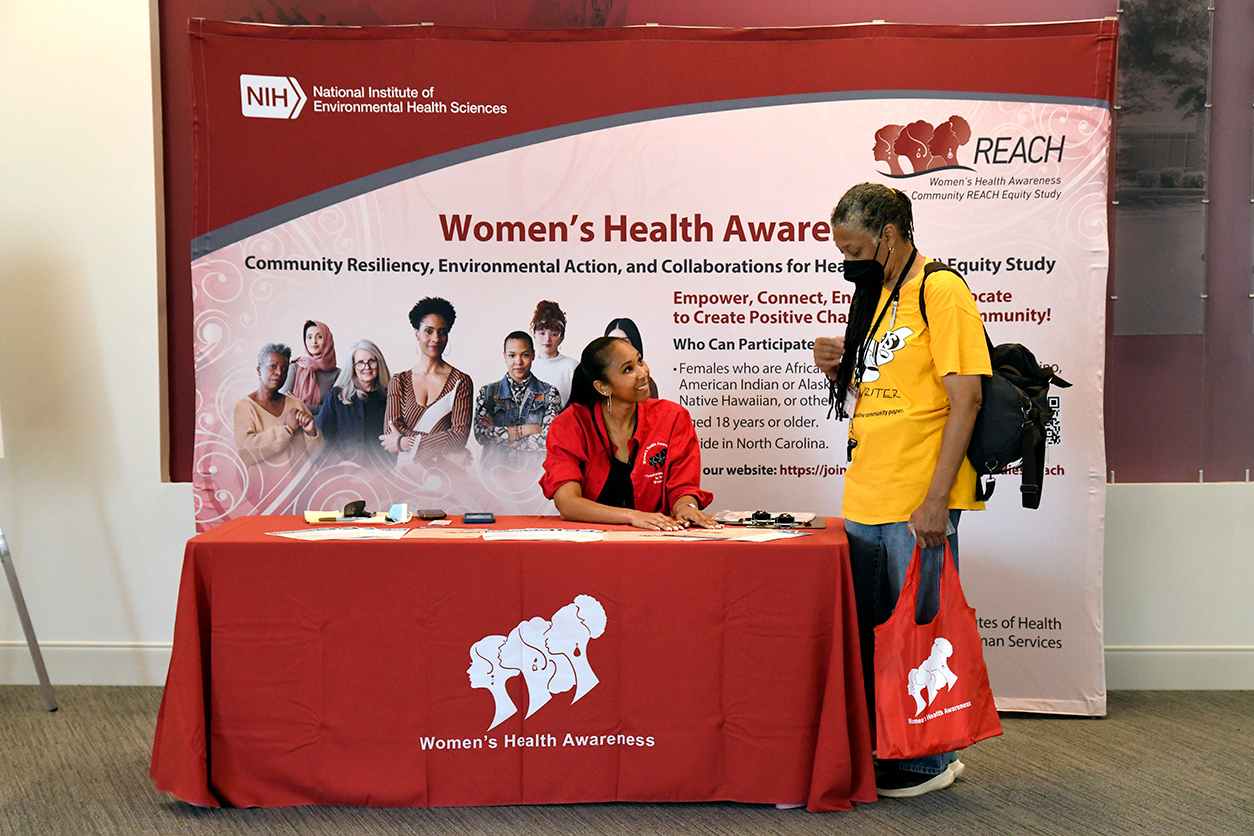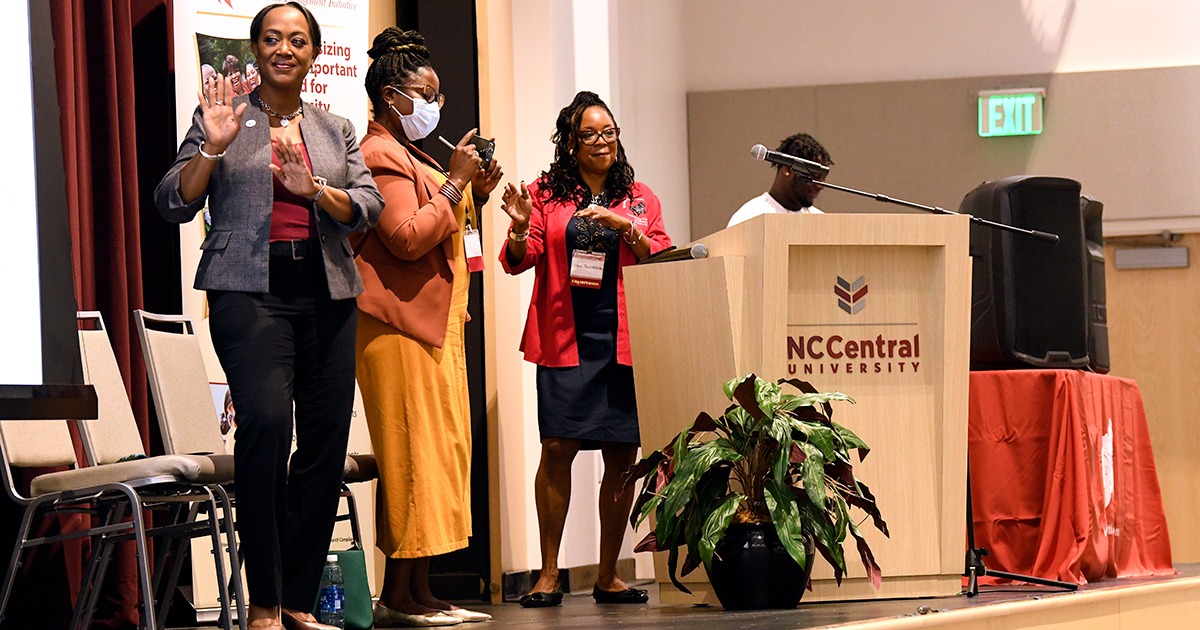The NIEHS Women’s Health Awareness (WHA) Program sponsored an event titled “Your Health is Your Job” at North Carolina Central University (NCCU) in Durham, North Carolina, Sept. 17. A wide range of free health education, resources, and career exploration activities were offered to the 325 people who registered for the conference.
“This event gave us an opportunity to provide students and attendees with valuable health information and resources, career resources, and professional skills that will prepare them for this competitive job market,” said Joan Packenham, Ph.D., director of the NIEHS Office of Human Research and Community Engagement and the WHA Program.
Economic stability is a social determinant of health, and economic security is essential for the health and well-being of families and communities, according to Packenham. Approximately one in 10 people live in poverty in the United States, with more women than men living in poverty, and women of color disproportionately impacted by poverty.
“Economic instability contributes to wide health disparities and inequities,” she said. “People with steady, professional employment are less likely to live in poverty and more likely to be healthy.”
A wide-ranging event
Throughout the day, more than 25 organizations representing city, state, and federal organizations, businesses, and community partners provided health information and resources, and offered insights into internship opportunities for college students in health and science, technology, engineering, and math (STEM) fields. The Scholars Connect Program and Office of Fellows’ Career Development participated by providing information about training opportunities at NIEHS.
Health care partners offered free mammograms, breast and cervical health education, blood pressure tests, rapid glucose checks, COVID-19 vaccinations and test kits, screenings for sexually transmitted diseases, and more. Local professional organizations shared critical job skills, offered resume development, and provided professional headshots.
 Invision Diagnostics conducted free mammograms at the WHA event that took place at NCCU. (Photo courtesy of Steve McCaw / NIEHS)
Invision Diagnostics conducted free mammograms at the WHA event that took place at NCCU. (Photo courtesy of Steve McCaw / NIEHS)The conference kicked off with introductory remarks from Packenham and a welcome address from Catherine Edmonds, Ed.D., from the NCCU Office of the Chancellor, on behalf of Chancellor Johnson Akinleye, Ph.D.
Edmonds shared captivating testimony of her breast cancer journey as a 15-year survivor, encouraging women of color to participate in clinical research as she had done. She said it could save their lives as well as the lives of countless other women. The importance of minorities participating in clinical research was later reiterated by Packenham during her presentation “You Can Make a Difference: Empowering Minority Women for Clinical Research.”
“Lack of representation in clinical research compounds disparities in health outcomes, leading to serious health consequences for minority groups,” Packenham said.
Reproductive health and wellness
A session titled “Girl Chat” featured a moderated panel discussion with women’s health experts. They provided information on, and answered participant questions about reproductive and sexual health, healthy relationships, and physical and mental wellness.
The panel was moderated by Tara Owens Shuler, with the of the North Carolina Department of Health and Human Services, Maternal Health Branch, Division of Public Health. Panelists included Tanya Bass, Ph.D., founder of the North Carolina Sexual Health Conference and NCCU Department of Public Health Education instructor; Estena Bradley, a women’s health nurse practitioner at Maria Parham Health; and Felicia Browne, Sc.D., senior research social epidemiologist in RTI International’s Substance Use, Gender, and Applied Research Program.
Bass presented the keynote address titled “Working It: Our Bodies, Our Rights,” in which she discussed how a complete understanding of sexual health and wellness must evolve from a purely disease perspective to a broader, inclusive view of what it means to be sexually healthy.
Al Duncan, lead trainer with Soft Skills for STEM, gave a talk titled “The Exceptional Young Professional: What Separates the Best from the Rest.” He provided information on how to thrive as a young professional in the 21st century. Participants learned about “soft skills” — such as communication, listening, and time management — that will give them competitive advantage and how to build a personal brand. Soft Skills for STEM is a program led by Michelle Lee, Ph.D., of the Los Alamos National Laboratory.
Study recruitment drive
The event also included a recruitment drive for the NIEHS Women’s Health Awareness Community Resiliency, Environmental Action, and Collaborations for Health (REACH) Equity Study. REACH seeks to understand the long-term impacts of COVID-19 on minority women and their families to assist in developing community-based programs for recovery and resiliency.
 Jaslyn Grullon, REACH Equity Study coordinator, recruited interested participants throughout the day’s event. (Photo courtesy of Steve McCaw / NIEHS)
Jaslyn Grullon, REACH Equity Study coordinator, recruited interested participants throughout the day’s event. (Photo courtesy of Steve McCaw / NIEHS)“This event was a big success, and we had a larger turnout than expected,” Packenham said. “We successfully launched our recruitment for the WHA REACH Equity study, and we were able to provide students and other attendees with critical job skills, career information, and health resources,” Packenham said.
The Durham Alumnae Chapter of Delta Sigma Theta Sorority Inc., the Durham Alumnae Delta House Inc., and the NCCU Department of Public Health Education co-sponsored the event.
(Lindsay Key is a contract writer for the NIEHS Office of Communications and Public Liaison.)
Source link
factor.niehs.nih.gov

